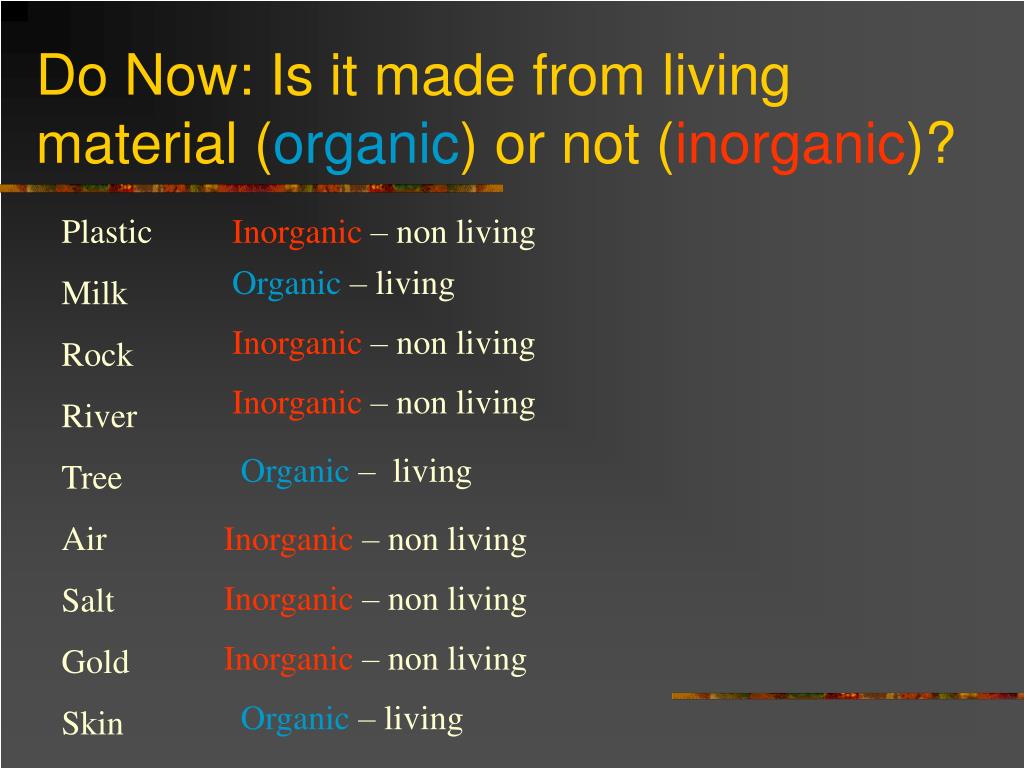
Some calcium salts are organic some calcium salts are inorganic. Table salt or sodium chloride NaCl carbon dioxide CO 2.
Some calcium salts are organic some calcium salts are inorganic.
Are salts organic or inorganic. Salts are an Inorganic compound What is Organic compound and Inorganic compound. Organic compound An organic compound is virtually any chemical compound that contains carbon although a consensus definition remains elusive and likely arbitrary. Organic compounds are rare terrestrially but of central importance because all known life is based on organic compounds.
Now we can answer the question. Is salt an organic compound. There are both organic and inorganic salts.
However salts like table salt sodium chloride baking soda sodium chloride calcium carbonate and muriatic acid industrial-grade hydrochloric acid are some of the commonly known inorganic compounds. Therefore Salts are not Organic compounds but inorganic compounds with exception to all salts derived from organic acids like sodium acetate etc. Salts and Inorganics Inorganics are elements and compounds including carbon monoxide carbon dioxide carbonates cyanides cyanates and carbides that do not contain a carbon-hydrogen bond.
This group also includes carbon allotropes such as graphite and graphene. A salt is a compound formed when an acid neutralizes a base. Therefore Salts are not Organic compounds but inorganic compounds with exceptio Organic compounds are sometimes called carbon compounds.
Carbon compounds are made of carbon bonded to other atoms with exception of carbonates and hydrogen carbonates. Click to see full answer. An organic salt is a salt containing an organic ion carbon atoms The reaction product of an organic acid and an inorganic base for example sodium acetate CH3COONa from the reaction of.
Some calcium salts are organic some calcium salts are inorganic. Ionic liquids are organic salts which are composed of organic cations and either organic or inorganic anions. Minimization of solvent loss less exposure to hazardous vapors and low toxicity makes them attractive for industrial use.
Therefore Salts are not Organic compounds but inorganic compounds with exception to all salts derived from organic acids like sodium acetate etc. Inorganics include salts metals substances made from single elements and any other compounds that dont contain carbon bonded to hydrogen. Some inorganic molecules do in fact contain carbon.
Table salt or sodium chloride NaCl carbon dioxide CO 2. Not only are there plenty of inorganic compounds that dont form salts for example sulfur hexafluoride SF 6 but there are a number of organic compounds that do form salts. Not only carboxylic acids but amines alcohols and even acetylene can form salts.
Numerous economically or medically significant organic compounds are salts. These days tissue salts are usually prepared as tablets made up with lactose powder in a manner similar to homeopathic products. Each inorganic salt is ground triturated with lactose powder in a ratio of 19 and this mixture is then ground with fresh lactose again in a 19 ratio.
Different organic and inorganic salts of prasugrel are prepared by carrying out reaction between prasugrel base and acids at a molar ratio of 112 in a mixture of acetonitrile and ethanol or acetone and ethanol at 0100 C for 124 h to obtain prasugrel HA salts HA is selected from organic acids namely methylsulfonic fumaric acetic oxalic succinic tartaric salicylic or. Salts and Inorganics Inorganics are elements and compounds including carbon monoxide carbon dioxide carbonates cyanides cyanates and carbides that do not contain a carbon-hydrogen bond. This group also includes carbon allotropes such as graphite and graphene.
IMPORTANCE OF INORGANIC SALTS Inorganic salts or mineral salts are important for the cell nutrition of the body since the deficiency of any of these will prevent these cells assimilate and use complex organic compounds helping the suffering of certain diseases.
